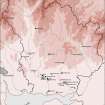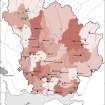Pricing Change
New pricing for orders of material from this site will come into place shortly. Charges for supply of digital images, digitisation on demand, prints and licensing will be altered.
Carruthers Church
Architectural Fragment(S) (Medieval), Burial Ground (Medieval), Church (Medieval), Font (Medieval)(Possible), Grave Slab(S) (Medieval) - (Post Medieval), Moated Site (Medieval)(Possible)
Site Name Carruthers Church
Classification Architectural Fragment(S) (Medieval), Burial Ground (Medieval), Church (Medieval), Font (Medieval)(Possible), Grave Slab(S) (Medieval) - (Post Medieval), Moated Site (Medieval)(Possible)
Alternative Name(s) Crowdieknowe; Carruthers Old Churchyard
Canmore ID 67206
Site Number NY28SE 3
NGR NY 25759 80190
Datum OSGB36 - NGR
Permalink http://canmore.org.uk/site/67206
- Council Dumfries And Galloway
- Parish Middlebie
- Former Region Dumfries And Galloway
- Former District Annandale And Eskdale
- Former County Dumfries-shire
Carruthers 1, Dumfriesshire, cross-slab
Measurements: H c1.07m, W 0.55m
Stone type:
Place of discovery: NY 2575 8019
Present location: in churchyard?
Evidence for discovery: found in three fragments built into the churchyard wall.
Present condition: broken but carving good.
Description
Firmly carved with an equal-armed cross with wedge-shaped arms and central roundel, set on a truncated shaft, the whole with a double outline except at the inner arm pits.
Date: twelfth century or earlier.
References: RCAHMS 1997, no 1787, 257, 259.
Desk-based information compiled by A Ritchie 2019.
Carruthers 2, Dumfriesshire: grave-cover
Measurements: L 1.65m, W 0.48m
Stone type:
Place of discovery: NY 2575 8019
Present location: in lowest course of churchyard wall near gate.
Evidence for discovery: noticed in the wall during RCAHMS fieldwork in 1912.
Present condition:
Description
The slab is almost complete but lacks the foot, where there is a suggestion of an expanded cross-base. Carved with a single outline, this is an equal-armed cross with wedge-shaped arms set on a narrow shaft. The arm-pits are simple V-shapes.
Date: twelfth century
References: RCAHMS 1997, no 1787, 257, 259.
Desk-based information compiled by A Ritchie 2019
NY28SE 3.00 257 801.
(NY 257 801) Graveyard (NR)
OS 6" map (1957)
NY28SE 3.01 25760 80190 Church; Burial-ground; Moated Site (possible)
NY28SE 3.02 257 801 Architectural Fragments; Medieval Grave-slabs; Font (possible)
For (site of) Carruthers village (NY 2502 8070), see NY28SE 2. For Pennersaughs Church (NY 2073 7439) and (present) Middlebie Parish Church (NY 2142 7615), see NY27SW 1 and NY27NW 13, respectively.
The parish of Carruthers was joined by Parliament to Middlebie and Pennersaughs (NY27SW 1), 24th June 1609.
H Scott 1915-61.
The parish of Carruthers was annexed to Middlebie in 1609. The church, still standing at the middle of the 17th century (G Chalmers 1890) has been demolished. Set in the churchyard wall, in the lowest course on the right of the gate, is an incised slab, while a richly carved slab forms the gate-post on the left of the entrance. In the SW corner of the churchyard is a font-like basin in the form of a scalloped capital suggestive of Norman design.
RCAHMS 1920.
Carruthers (Glasgow, Annandale). An independent parsonage in Bagimond, the church remained unappropriated, its parsonage being granted to Adam Hepburn, Earl of Bothwell in 1511.
I B Cowan 1967.
There are no indications of the church in the graveyard. The slabs and font-like basin are still in the positions given by RCAHMS but no date could be given for either. The graveyard is still used occassionally.
Visited by OS (RD), 19 June 1970.
Field Visit (28 September 1993)
NY28SE 3.00 2576 8019
This church stood within its burial-ground to the S of Crowdieknowe farmhouse (NY28SE 72.00).
Visited by RCAHMS (IMS, PC, IF), 28 September 1993.
Carruthers. Listed as church, burial-ground, medieval graveslabs and architectural fragments.
RCAHMS 1997.
Field Visit (1996 - 2003)
Russell Coleman managed an Historic Scotland funded project to record medieval moated sites in Scotland. Gazetteers were produced for each regional council area between 1996 and 2002 with an uncompleted overall review in 2002-03. The results of the first year of the project were published in Tayside and Fife Archaeological Journal, Volume 3 (1997).
















